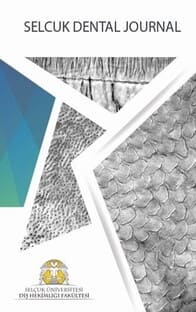Travma sonucu oluşan anterior tek diş eksikliklerinin implant destekli sabit restorasyonlar ile tedavisi: 2 olgu sunumu
Dentoalveolar travmalar genç bireylerde ve özellikle maksiller anterior bölgede sıklıkla karşılaşılan olgulardandır. Bu travmalar sonucu oluşan tek diş eksikliklerinde hastaların yüksek estetik beklentilerini karşılamak için uygun materyal seçimi ve detaylı bir planlama büyük önem arz etmektedir. Bu olgu sunumunun amacı dentoalveolar travma sonucu maksiller santral dişini kaybetmiş 2 genç erkek hastanın implant destekli, kişiye özel üretilmiş zirkonya abutmentlar üzerine uygulanan zirkonya altyapılı tam seramik tek kronlar ile tedavisini sunmaktır. 23 ve 18 yaşında iki genç erkek hasta geçirdikleri dental travma sebebi ile maksiller santral dişlerini kaybetmiştir. Her iki hastaya birer adet kemik seviyesi implant yerleştirildi ve iyileşme sonrası yumuşak doku şekillendirmesi yapıldı. Kişiye özel olarak üretilen zirkonya abutmentlardan destek alan zirkonya altyapılı tam seramik restorasyonlar hastalara teslim edildi. Hastaların estetik ve fonksiyonel beklentileri karşılandı. 1 yıllık takip sonunda herhangi bir komplikasyonla karşılaşılmadı.
Anahtar Kelimeler:
Dental implant, dental travma, estetik, kişiye özel abutment, zirkonya
Treatment of anterior single tooth loss caused by trauma with implant supported fixed restorations: 2 Case reports
Dentoalveolar traumas are common in young adults especially at the maxillary anterior region. Careful treatment planning and suitable material selection have crucial importance for single-tooth loss caused by traumas to meet the high esthetic expectations of the patient. The aim of this case report is to present the treatment of 2 young adult male patients who have lost their maxillary central incisors because of dentoalveolar trauma by implant retained custom zirconia abutments and zirconia based all-ceramic single crowns.23 and 18 year-old young male patients have lost their maxillary central incisors caused by dental trauma. One bone level implant for each patient were placed and after the healing period periimplant soft tissue was manipulated. Definitive zirconia based all-ceramic restorations supported by customized zirconia abutments were delivered to the patients.The patients’ aesthetic and functional expectations were achieved. After one-year follow-up no complications were observed.
Keywords:
Aesthetic, custom abutment, dental implant, dental trauma, zirconia,
___
- Andreasen FM, Andreasen JO, 1994. Root fractures, In: Textbook and color atlas of traumatic injuries to the teeth, Ed; Andreasen JO, Andreasen FM, Third Edition, Munksgaard Publishers, Copenhagen, Denmark, pp; 279-314.
- Buser D, Martin W, Belser UC, 2004. Optimizing esthetics for implant restorations in the anterior maxilla: anatomic and surgical considerations. Int J Oral Maxillofac Implants, 19, 43-61.
- Caliskan MK, Pehlivan Y, 1996. Prognosis of root-fractured permanent incisors. Endod Dent Traumatol, 12, 129-136.
- Darby I, Chen ST, Buser D, 2009. Ridge preservation techniques for implant therapy. Int J Oral Maxillofac Implants, 24, 260-271.
- Edelhoff D, Spiekermann H, Yildirim M, 2002. A review of esthetic pontic options. Quint Int, 33, 736-746.
- Funato A, Salama MA, Ishikawa T, Garber DA, Salama H, 2007. Timing, positioning, and sequential staging in esthetic implant therapy: A four-dimensional perspective. Int J Periodontics Restorative Dent, 27, 313-323.
- Grunder U, Gracis S, Capelli M, 2005. Influence of the 3-D bone-to-implant relationship on esthetics. Int J Periodontics Restorative Dent, 25, 113-119.
- Hermann JS, Buser D, Schenk RK, Higginbottom FL, Cochran DL, 2000. Biologic width around titanium implants. A physiologically formed and stable dimension over time. Clin Oral Implants Res, 11, 1-11.
- Kan JY, Rungcharassaeng K, Umezu K, Kois JC, 2003. Dimensions of peri-implant mucosa: an evaluation of maxillary anterior single implants in humans. J Periodontol, 74, 557-562.
- Lee CY, Hasegawa H, 2008. Immediate load and esthetic zone considerations to replace maxillary incisor teeth using a new zirconia implant abutment in the bone grafted anterior maxilla. J Oral Implantol, 34, 259-267.
- ISSN: 2148-7529
- Yayın Aralığı: Yılda 3 Sayı
- Başlangıç: 2014
- Yayıncı: Selcuk Universitesi Dişhekimliği Fakültesi
Sayıdaki Diğer Makaleler
Ana modelin elde edilmesinde vakumlu kabin tekniği
Yusuf Ziya AKPINAR, Muhammed Ali ASLAN, NUMAN TATAR, Betül YILMAZ
Zeynep Aslı GÜÇLÜ, NAZMİYE DÖNMEZ, TAMER TÜZÜNER, BARIŞ KARABULUT
SELEN İNCE YUSUFOĞLU, Mine ÖZÇELİK, Hale AYDINBELGE ARI
Sınıf 5 kavitelerde restoratif materyal seçimi
Elif YEĞİN, Yusuf Ziya AKPINAR, Bülent TOPBAŞI, Pınar YILMAZ
Mandibuler rekonstrüksiyonlu bir hastada protetik tedavi: Olgu sunumu
TUĞRUL SARI, Ahmet MİHMANLI, Mehmet Veli KARAALTIN
Maksillofasiyal travma geçirmiş bir hastaya multidisipliner tedavi yaklaşımı: Olgu sunumu
